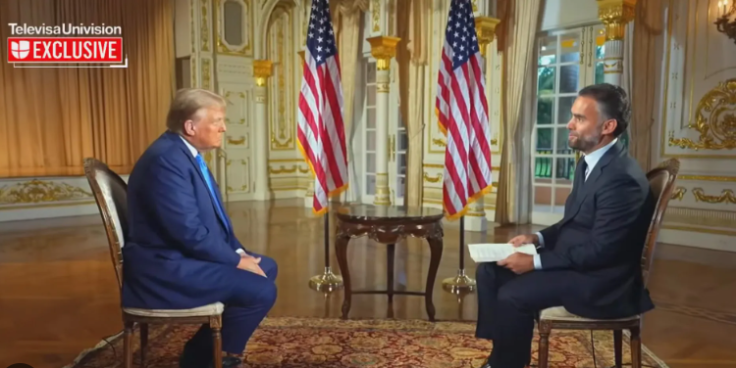
Wade Davis, CEO of TelevisaUnivision, publicly defended the network's interview with former President Donald Trump, criticized by prominent Latino political figures and advocacy groups for a lack of confrontation and follow-up questions.
"We made a decision to adopt a strategy that is different than what some other major networks are using, which has been labeled as partisan," said Davis in a statement reported by Variety.
"Univision's news strategy is one that is non-partisan and objective, and we serve our audience by being welcoming of competing issues, ideas, candidates and parties. We are here to serve our audience, not any political party, any one candidate or partisan groups," the statement added.
The network has been openly critical of Trump and his policies in the past, so the interview's tone stood out in contrast. The fact that the Washington Post reported that Jared Kushner, Trump's son-in-law, helped arrange it, only contributed to raising eyebrows. So did the timing of news about long-time anchor Leon Krauze's departure from the network after 13 years.
"My unwavering commitment, past, present, and future, is to journalism that amplifies the voices and illuminates the stories of those who so often go unheard and unseen," said Krauze, without elaborating on the reason for his decision.
Titled "Univision, the Spanish language news giant, shifts its approach to Trump," the Washington Post article claims that Univision and the Trump campaign have been getting closer recently. The outlet made reference to a Semafor report about the presence of TelevisaUnivision's executives at the interview with Trump, and that "people familiar with the situation inside Univision described alarm and discomfort in the newsroom last week about corporate's role setting up the Trump interview, the selection of the interviewer and the decision to shut out Biden's response."
Concretely, Trump was interviewed by Enrique Acevedo and not Krauze or Jorge Ramos, network icons who may have taken a more confrontational stance. Ramos was famously kicked out of a rally by Trump in 2015 before he became president.
Trump has been steadily gaining support with the Latino electorate during the past decade, increasing from 28% in 2016 to 36% in 2020, according to the Pew Research Center. In 2022, Republicans got 39 percent of the Latino vote, the highest percentage since 2004.
Asked about why he believed more Latinos were identifying as conservative, he said: "It is a big honor because it has happened since I became President. They are entrepreneurial, energetic. Some of the best businesses are ran by Latinos. They want security too. They don't want people breaking into their houses. I think that is one of the reasons why they like me."
A group of Latino leaders requested a meeting with Wade Davis shortly after the interview and subsequent backlash, voicing their concern about the interview being part of a larger strategic effort by the network to cultivate a closer relationship with Trump.
Among the ones signing the letter are: Frankie Miranda,President and CEO, Hispanic Federation; Hector Sanchez Barba, President and CEO; Mi Familia Vota, Janet Murguía, President and CEO, UnidosUS; María Teresa Kumar, President, Voto Latino; and Sindy Benavides, President & CEO, Latino Victory.
The Congressional Hispanic Caucus (CHC) also requested a meeting with Davis last week. In a letter obtained by The Latin Times, the CHC questioned the network's recent political reporting and its adherence to editorial guidelines.
"Circumstances surrounding the interview with former president Trump have given the appearance that the company has not upheld these standards," the letter reads.
According to The Washington Post, a group called American Principles Project, which has an office of Hispanic Engagement, sent their own letter to Univision expressing support for the Trump interview.
The group said that "if sent," the CHC, all of whose members are Democrats, "would constitute a direct attack on a free and independent press and a form of electoral interference."
The Post reported that others who signed the letter include Mike González, a senior fellow at the Heritage Foundation; Catalina Stubbe, director of Hispanic outreach for Moms for Liberty; and Mercedes Schlapp, a senior fellow at the CPAC Foundation.
© 2025 Latin Times. All rights reserved. Do not reproduce without permission.





